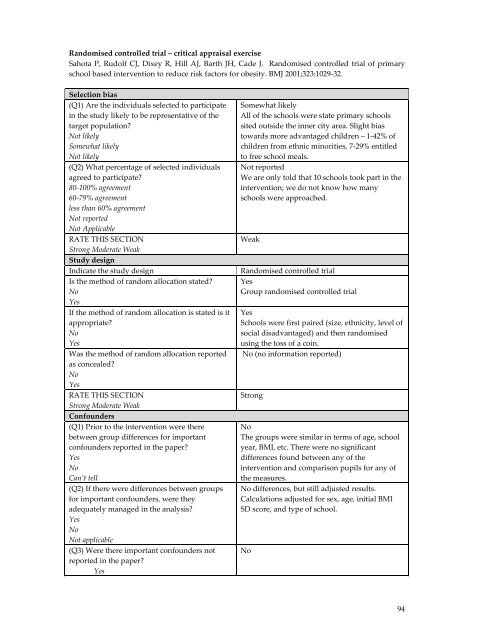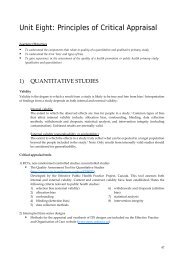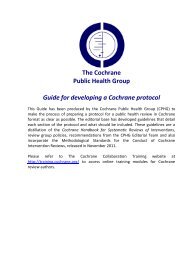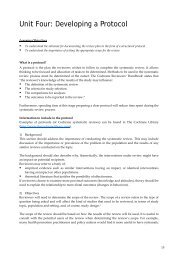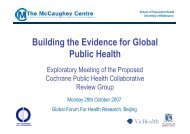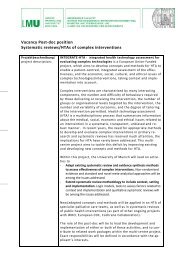Train the Trainer Course book - Cochrane Public Health Group
Train the Trainer Course book - Cochrane Public Health Group
Train the Trainer Course book - Cochrane Public Health Group
You also want an ePaper? Increase the reach of your titles
YUMPU automatically turns print PDFs into web optimized ePapers that Google loves.
Randomised controlled trial – critical appraisal exercise<br />
Sahota P, Rudolf CJ, Dixey R, Hill AJ, Barth JH, Cade J. Randomised controlled trial of primary<br />
school based intervention to reduce risk factors for obesity. BMJ 2001;323:1029-32.<br />
Selection bias<br />
(Q1) Are <strong>the</strong> individuals selected to participate<br />
in <strong>the</strong> study likely to be representative of <strong>the</strong><br />
target population?<br />
Not likely<br />
Somewhat likely<br />
Not likely<br />
(Q2) What percentage of selected individuals<br />
agreed to participate?<br />
80-100% agreement<br />
60-79% agreement<br />
less than 60% agreement<br />
Not reported<br />
Not Applicable<br />
RATE THIS SECTION<br />
Strong Moderate Weak<br />
Study design<br />
Indicate <strong>the</strong> study design<br />
Is <strong>the</strong> method of random allocation stated?<br />
No<br />
Yes<br />
If <strong>the</strong> method of random allocation is stated is it<br />
appropriate?<br />
No<br />
Yes<br />
Was <strong>the</strong> method of random allocation reported<br />
as concealed?<br />
No<br />
Yes<br />
RATE THIS SECTION<br />
Strong Moderate Weak<br />
Confounders<br />
(Q1) Prior to <strong>the</strong> intervention were <strong>the</strong>re<br />
between group differences for important<br />
confounders reported in <strong>the</strong> paper?<br />
Yes<br />
No<br />
Can’t tell<br />
(Q2) If <strong>the</strong>re were differences between groups<br />
for important confounders, were <strong>the</strong>y<br />
adequately managed in <strong>the</strong> analysis?<br />
Yes<br />
No<br />
Not applicable<br />
(Q3) Were <strong>the</strong>re important confounders not<br />
reported in <strong>the</strong> paper?<br />
Yes<br />
Somewhat likely<br />
All of <strong>the</strong> schools were state primary schools<br />
sited outside <strong>the</strong> inner city area. Slight bias<br />
towards more advantaged children – 1-42% of<br />
children from ethnic minorities, 7-29% entitled<br />
to free school meals.<br />
Not reported<br />
We are only told that 10 schools took part in <strong>the</strong><br />
intervention; we do not know how many<br />
schools were approached.<br />
Weak<br />
Randomised controlled trial<br />
Yes<br />
<strong>Group</strong> randomised controlled trial<br />
Yes<br />
Schools were first paired (size, ethnicity, level of<br />
social disadvantaged) and <strong>the</strong>n randomised<br />
using <strong>the</strong> toss of a coin.<br />
No (no information reported)<br />
Strong<br />
No<br />
The groups were similar in terms of age, school<br />
year, BMI, etc. There were no significant<br />
differences found between any of <strong>the</strong><br />
intervention and comparison pupils for any of<br />
<strong>the</strong> measures.<br />
No differences, but still adjusted results.<br />
Calculations adjusted for sex, age, initial BMI<br />
SD score, and type of school.<br />
No<br />
94


